乔治奥威尔自序
《书店轶事》奥威尔散文

《书店轶事》奥威尔散文《书店轶事》是英国作家乔治·奥威尔的一篇散文,通过描绘书店的日常生活和工作环境,以及书店中发生的种种有趣故事,展现了作者对书店的热爱和对文学的无尽追求。
文章的开头,奥威尔以生动的语言描绘了书店的外观和布置。
“那间书店位于一座古老的建筑物里,门前摆放着一些书摊,书摊上堆满了各种各样的书籍。
”他将这个书店比喻成“一座闹市中一座燃烧着熊熊烈火的灯塔”,给人一种温暖舒适的感觉。
接下来,奥威尔详细描述了书店里的一些工作人员。
他们有老板,也有店员,每个人都对自己的工作充满热情。
“当你走进书店时,一位和蔼可亲的老板会迎接你,他的眼睛闪烁着对书籍的狂热之光。
”奥威尔对书店员工的描写令人对他们产生了极大的兴趣和好感。
随后,奥威尔展现了书店中充斥着的各种各样的人。
他们有各行各业的读者,也有喜爱文学的学生和作家。
“每天都会有一些人走进书店,或是寻找某本书,或是尽情地享受文学的魅力。
”这种场景给人一种书店是文化交流的聚集地的感觉,让人想要沉浸在这样的氛围中。
同时,奥威尔回忆了一些书店里发生的有趣的故事。
“有一次,一个急匆匆的读者跑进书店,急切地找他想要的那本书。
当我们告诉他找不到时,他喊道:‘没有找到那本书?那我肯定是进错了书店!’”这个小小的插曲让人忍俊不禁,也反映出书店工作的忙碌和有趣之处。
最后,奥威尔用深情的语言表达了他对书店这个地方的真挚情感。
“书店是我的家,文学是我的灵魂。
在这里,我可以随心所欲地穿行在文字的海洋中,与作者们对话,与读者们分享。
”这种对书店和文学的热爱使他得以真正融入书店的氛围中,为这个地方注入了无尽的生机和活力。
通过《书店轶事》,奥威尔向读者传达了他对书店和文学的热爱,也展现了书店的魅力和活力。
这篇文章用生动的描写和有趣的故事,将读者带入了一个充满魔力的世界,给人以指导意义,呼吁人们重拾对书籍和文学的热忱,将书店看作是文化交流的重要场所,为自己的人生增添一抹色彩。
名著的开头摘抄简短
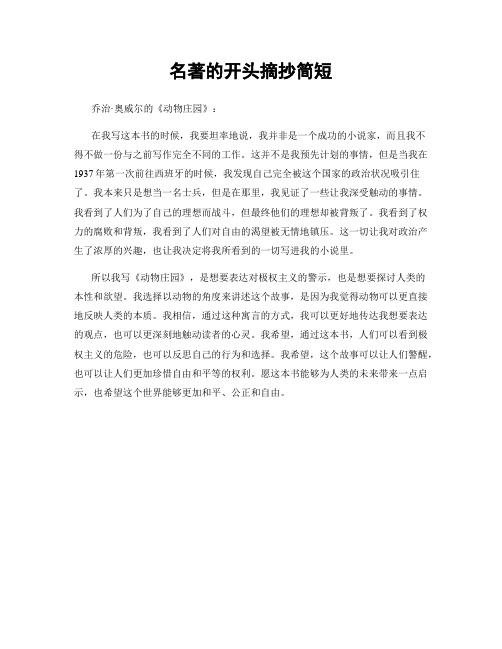
名著的开头摘抄简短
乔治·奥威尔的《动物庄园》:
在我写这本书的时候,我要坦率地说,我并非是一个成功的小说家,而且我不
得不做一份与之前写作完全不同的工作。
这并不是我预先计划的事情,但是当我在1937年第一次前往西班牙的时候,我发现自己完全被这个国家的政治状况吸引住了。
我本来只是想当一名士兵,但是在那里,我见证了一些让我深受触动的事情。
我看到了人们为了自己的理想而战斗,但最终他们的理想却被背叛了。
我看到了权力的腐败和背叛,我看到了人们对自由的渴望被无情地镇压。
这一切让我对政治产生了浓厚的兴趣,也让我决定将我所看到的一切写进我的小说里。
所以我写《动物庄园》,是想要表达对极权主义的警示,也是想要探讨人类的
本性和欲望。
我选择以动物的角度来讲述这个故事,是因为我觉得动物可以更直接地反映人类的本质。
我相信,通过这种寓言的方式,我可以更好地传达我想要表达的观点,也可以更深刻地触动读者的心灵。
我希望,通过这本书,人们可以看到极权主义的危险,也可以反思自己的行为和选择。
我希望,这个故事可以让人们警醒,也可以让人们更加珍惜自由和平等的权利。
愿这本书能够为人类的未来带来一点启示,也希望这个世界能够更加和平、公正和自由。
乔治奥威尔:我为什么要写作
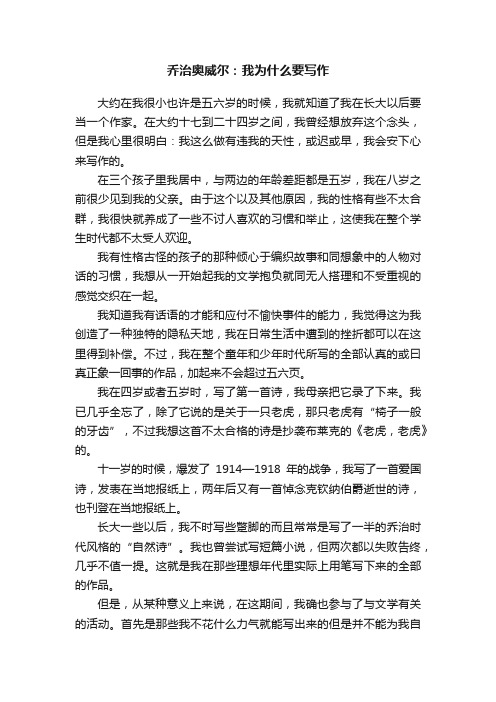
乔治奥威尔:我为什么要写作大约在我很小也许是五六岁的时候,我就知道了我在长大以后要当一个作家。
在大约十七到二十四岁之间,我曾经想放弃这个念头,但是我心里很明白:我这么做有违我的天性,或迟或早,我会安下心来写作的。
在三个孩子里我居中,与两边的年龄差距都是五岁,我在八岁之前很少见到我的父亲。
由于这个以及其他原因,我的性格有些不太合群,我很快就养成了一些不讨人喜欢的习惯和举止,这使我在整个学生时代都不太受人欢迎。
我有性格古怪的孩子的那种倾心于编织故事和同想象中的人物对话的习惯,我想从一开始起我的文学抱负就同无人搭理和不受重视的感觉交织在一起。
我知道我有话语的才能和应付不愉快事件的能力,我觉得这为我创造了一种独特的隐私天地,我在日常生活中遭到的挫折都可以在这里得到补偿。
不过,我在整个童年和少年时代所写的全部认真的或曰真正象一回事的作品,加起来不会超过五六页。
我在四岁或者五岁时,写了第一首诗,我母亲把它录了下来。
我已几乎全忘了,除了它说的是关于一只老虎,那只老虎有“椅子一般的牙齿”,不过我想这首不太合格的诗是抄袭布莱克的《老虎,老虎》的。
十一岁的时候,爆发了1914—1918年的战争,我写了一首爱国诗,发表在当地报纸上,两年后又有一首悼念克钦纳伯爵逝世的诗,也刊登在当地报纸上。
长大一些以后,我不时写些蹩脚的而且常常是写了一半的乔治时代风格的“自然诗”。
我也曾尝试写短篇小说,但两次都以失败告终,几乎不值一提。
这就是我在那些理想年代里实际上用笔写下来的全部的作品。
但是,从某种意义上来说,在这期间,我确也参与了与文学有关的活动。
首先是那些我不花什么力气就能写出来的但是并不能为我自己带来很大乐趣的应景之作。
除了为学校唱赞歌以外,我还写些带有应付性质半开玩笑的打油诗,我能够按今天看来是惊人的速度写出来。
比如说我在十四岁的时候,曾花了大约一个星期的时间,模仿阿里斯托芬的风格写了一部押韵的完整的诗剧。
我还参加了编辑校刊的工作,这些校刊都是些可笑到可怜程度的东西,有铅印稿,也有手稿。
乔治奥威尔

Childhood:
In 1914, 11-year-old Orwell published a poem Wake up, the boys in the local newspaper for the first time He studied in the most famous school Eton College(1917) morose,unsociable and disobedient
CONTENTS
Burma
career
BBC
France England
Spain
Burma (1922~1927)
Orwell joined the Indian Imperial Police for five years and eventually resigned the post in 1927. His experience in Burma, which made him recognize the evil side of colonialism and thus left the colonial police force.
“ A successful impersonation of a plain man who bumps into experience in an unmediated way and tells the truth about it.” ----Rushbrook Williams
“垂死的肺病患者,三十三年前 自己的喘息都已不继,就咳尽你 一腔的热血。”
title
Major Works
A List of his works
1931 A Hanging 《行刑》 1933 Down and Out in Paris and London 《巴黎伦敦落魄记》 1934 Burmese Days 《在缅甸的日子》 1935 A Clergyman’s Daughter 《牧师的女儿》 1936 Keep the Aspidistra Flying 《让叶兰在风中飞舞》 1938 Homage to Catalonia 《向加泰罗尼亚致敬》 1938 Marrakech 《马拉喀什》 1939 Coming up for Air 《上来透口气》 1940 Inside the Whale 《鲸鱼之中》
乔治奥威尔-George orwell

In the broadest sense, totalitarianism is characterized by strong central rule that attempts to control and direct all aspects of individual life through coercion and repression. Examples of such centralized totalitarian rule include the Maurya dynasty of India, the Ch’in dynasty of China, and the reign of Zulu chief Shaka. The totalitarian states of Nazi Germany under Adolf Hitler (1933–45) and the Soviet Union under Joseph Stalin (1924–53) were the first examples of decentralized or popular totalitarianism, in which the state achieved overwhelming popular support for its leadership. This support was not spontaneous; its genesis depended on a charismatic leader; and it was made possible only by modern developments in communication and transportation. Encyclopedia Britannica
乔治·奥威尔:我为什么写作
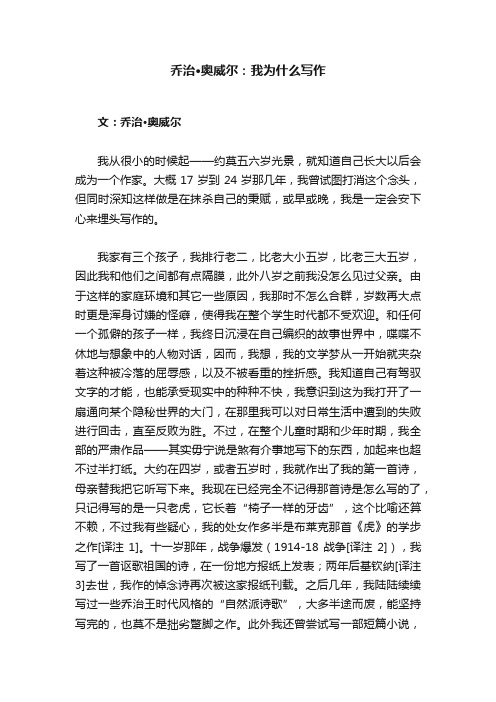
乔治·奥威尔:我为什么写作文:乔治·奥威尔我从很小的时候起——约莫五六岁光景,就知道自己长大以后会成为一个作家。
大概17岁到24岁那几年,我曾试图打消这个念头,但同时深知这样做是在抹杀自己的秉赋,或早或晚,我是一定会安下心来埋头写作的。
我家有三个孩子,我排行老二,比老大小五岁,比老三大五岁,因此我和他们之间都有点隔膜,此外八岁之前我没怎么见过父亲。
由于这样的家庭环境和其它一些原因,我那时不怎么合群,岁数再大点时更是浑身讨嫌的怪癖,使得我在整个学生时代都不受欢迎。
和任何一个孤僻的孩子一样,我终日沉浸在自己编织的故事世界中,喋喋不休地与想象中的人物对话,因而,我想,我的文学梦从一开始就夹杂着这种被冷落的屈辱感,以及不被看重的挫折感。
我知道自己有驾驭文字的才能,也能承受现实中的种种不快,我意识到这为我打开了一扇通向某个隐秘世界的大门,在那里我可以对日常生活中遭到的失败进行回击,直至反败为胜。
不过,在整个儿童时期和少年时期,我全部的严肃作品——其实毋宁说是煞有介事地写下的东西,加起来也超不过半打纸。
大约在四岁,或者五岁时,我就作出了我的第一首诗,母亲替我把它听写下来。
我现在已经完全不记得那首诗是怎么写的了,只记得写的是一只老虎,它长着“椅子一样的牙齿”,这个比喻还算不赖,不过我有些疑心,我的处女作多半是布莱克那首《虎》的学步之作[译注1]。
十一岁那年,战争爆发(1914-18战争[译注2]),我写了一首讴歌祖国的诗,在一份地方报纸上发表;两年后基钦纳[译注3]去世,我作的悼念诗再次被这家报纸刊载。
之后几年,我陆陆续续写过一些乔治王时代风格的“自然派诗歌”,大多半途而废,能坚持写完的,也莫不是拙劣蹩脚之作。
此外我还曾尝试写一部短篇小说,那是一场惨败的记录,不提也罢。
以上就是我在那些年间一本正经地写在纸上的全部成果。
然而从某种意义上讲,我在这一阶段的确也从事过一些文学活动。
其中首推毫无乐趣可言的命题作文,我可以一挥而就,不必费吹灰之力。
乔治奥威尔
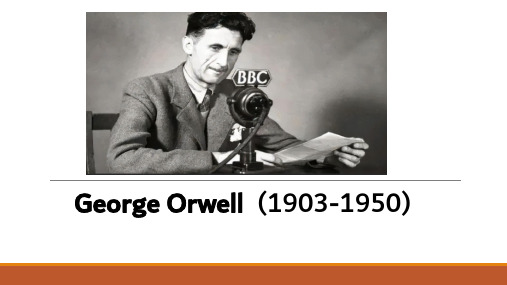
Orwell next explored his overseas experiences in Burmese Days, which offered a dark look at British colonialism in Burma, then part of the country's Indian empire. Orwell's interest in political matters grew rapidly after this novel was published.
In December 1936, the Spanish Civil War broke out. Orwell traveled to Spain, where he joined one of the groups fighting against General Francisco Franco who was supported by facisits and Nazi. Orwell was badly injured during his time with a militia, getting shot in the throat and arm. For several weeks, he was unable to speak. Later, in 1937, after having fought in Barcelona against communists who were trying to suppress their political opponents, he was forced to flee Spain in fear of his life. The experience left him with a lifelong dread of communism and he predicted that Spain would fall under fascist totalitarianism.
乔治·奥威尔语录

乔治·奥威尔语录
“自由就是在告诉人们他们不想听到的话。
” - 乔治·奥威尔
自由,是一种珍贵的权利,是每个人都应该享有的。
然而,有时候自由并不意
味着被人们所欢迎,因为它可能会揭露真相,挑战权威,甚至引发争议。
正如
乔治·奥威尔所说,“自由就是在告诉人们他们不想听到的话”。
在当今社会,言论自由是一个备受争议的话题。
人们对于言论自由的定义和边
界存在着不同的看法。
一些人认为,言论自由意味着可以说任何话,无论是真
实还是虚假,而另一些人则认为,言论自由应该有所限制,以避免伤害他人或
传播虚假信息。
然而,无论是哪种观点,言论自由都是一个重要的社会价值。
它允许人们表达
自己的观点和意见,促进了社会的多样性和进步。
言论自由也是监督政府和权
威的重要手段,它可以揭露腐败和不公正,推动社会的改革和进步。
然而,言论自由也需要负责任地行使。
在表达自己的观点和意见时,我们应该
尊重他人的权利和尊严,避免伤害他人或传播虚假信息。
我们也应该意识到,
言论自由并不意味着可以免于承担后果,我们需要为自己的言论负责。
总而言之,言论自由是一个重要的社会价值,它允许人们表达自己的观点和意见,监督政府和权威,推动社会的进步。
然而,言论自由也需要负责任地行使,尊重他人的权利和尊严,避免伤害他人或传播虚假信息。
只有这样,我们才能
真正享有自由,而不是被自由所束缚。
乔治·奥威尔语录
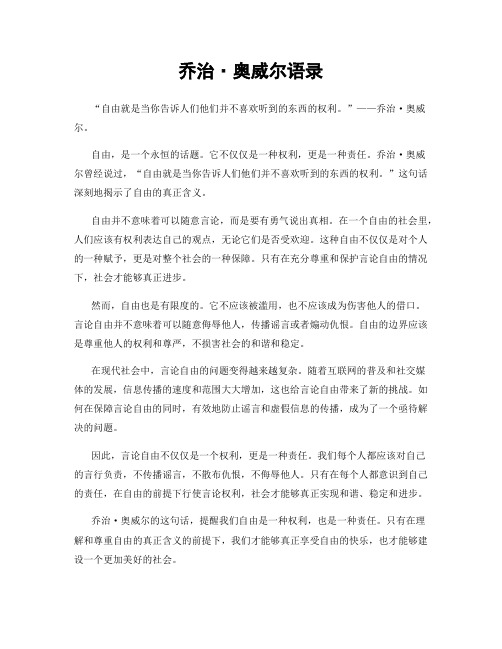
乔治·奥威尔语录“自由就是当你告诉人们他们并不喜欢听到的东西的权利。
”——乔治·奥威尔。
自由,是一个永恒的话题。
它不仅仅是一种权利,更是一种责任。
乔治·奥威尔曾经说过,“自由就是当你告诉人们他们并不喜欢听到的东西的权利。
”这句话深刻地揭示了自由的真正含义。
自由并不意味着可以随意言论,而是要有勇气说出真相。
在一个自由的社会里,人们应该有权利表达自己的观点,无论它们是否受欢迎。
这种自由不仅仅是对个人的一种赋予,更是对整个社会的一种保障。
只有在充分尊重和保护言论自由的情况下,社会才能够真正进步。
然而,自由也是有限度的。
它不应该被滥用,也不应该成为伤害他人的借口。
言论自由并不意味着可以随意侮辱他人,传播谣言或者煽动仇恨。
自由的边界应该是尊重他人的权利和尊严,不损害社会的和谐和稳定。
在现代社会中,言论自由的问题变得越来越复杂。
随着互联网的普及和社交媒体的发展,信息传播的速度和范围大大增加,这也给言论自由带来了新的挑战。
如何在保障言论自由的同时,有效地防止谣言和虚假信息的传播,成为了一个亟待解决的问题。
因此,言论自由不仅仅是一个权利,更是一种责任。
我们每个人都应该对自己的言行负责,不传播谣言,不散布仇恨,不侮辱他人。
只有在每个人都意识到自己的责任,在自由的前提下行使言论权利,社会才能够真正实现和谐、稳定和进步。
乔治·奥威尔的这句话,提醒我们自由是一种权利,也是一种责任。
只有在理解和尊重自由的真正含义的前提下,我们才能够真正享受自由的快乐,也才能够建设一个更加美好的社会。
乔治奥威尔英国作家和社会评论家
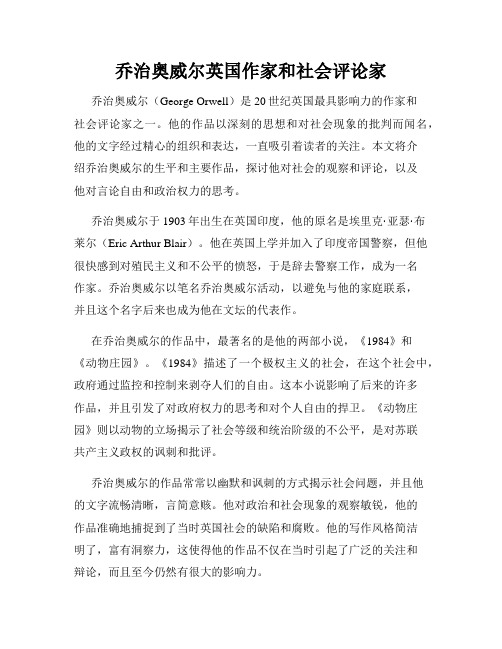
乔治奥威尔英国作家和社会评论家乔治奥威尔(George Orwell)是20世纪英国最具影响力的作家和社会评论家之一。
他的作品以深刻的思想和对社会现象的批判而闻名,他的文字经过精心的组织和表达,一直吸引着读者的关注。
本文将介绍乔治奥威尔的生平和主要作品,探讨他对社会的观察和评论,以及他对言论自由和政治权力的思考。
乔治奥威尔于1903年出生在英国印度,他的原名是埃里克·亚瑟·布莱尔(Eric Arthur Blair)。
他在英国上学并加入了印度帝国警察,但他很快感到对殖民主义和不公平的愤怒,于是辞去警察工作,成为一名作家。
乔治奥威尔以笔名乔治奥威尔活动,以避免与他的家庭联系,并且这个名字后来也成为他在文坛的代表作。
在乔治奥威尔的作品中,最著名的是他的两部小说,《1984》和《动物庄园》。
《1984》描述了一个极权主义的社会,在这个社会中,政府通过监控和控制来剥夺人们的自由。
这本小说影响了后来的许多作品,并且引发了对政府权力的思考和对个人自由的捍卫。
《动物庄园》则以动物的立场揭示了社会等级和统治阶级的不公平,是对苏联共产主义政权的讽刺和批评。
乔治奥威尔的作品常常以幽默和讽刺的方式揭示社会问题,并且他的文字流畅清晰,言简意赅。
他对政治和社会现象的观察敏锐,他的作品准确地捕捉到了当时英国社会的缺陷和腐败。
他的写作风格简洁明了,富有洞察力,这使得他的作品不仅在当时引起了广泛的关注和辩论,而且至今仍然有很大的影响力。
除了小说以外,乔治奥威尔还写了一些政治和社会评论的文章和散文。
他的文章经常涉及一些热门问题,如言论自由、媒体操控和政府腐败等。
他对这些问题的讨论深入透彻,他的观点引起了读者的共鸣和讨论。
他的文章具有启发性和批判性,激励着人们思考社会问题,并寻求解决的途径。
言论自由是乔治奥威尔一直关注的话题。
他认为,言论自由是民主社会的基石,人们应该有权利自由地表达意见和批评政府。
他对政府操控媒体和审查言论的做法表示强烈反对,认为这种做法是对人权的侵犯。
杨岂深《英国文学选读Book 3》笔记(乔治 奥威尔)【圣才出品】

第6单元乔治•奥威尔George Orwell (1903-1950) (乔治·奥威尔)1. Life(生平)George Orwell was an essayist, critic and writer. In 1921, he graduated from Eton College in Britain. In 1927, he successively stayed in London and Paris, living a poor life. His first novel Down and Out in Paris and London described the poor workers’ life in a capitalist society. From 1936 to 1937, he participated in the Spanish Civil War and went against fascism. Apart from novels, Orwell wrote many comments and prose. His writing style was simple and clean, without artificiality.乔治·奥威尔,散文家,评论家和小说家。
1921年毕业于英国伊顿公学。
1927年,先后在巴黎和伦敦闲居,生活贫困。
他的第一部小说《巴黎伦敦落魄记》描述了资本主义社会中穷苦工人的生活。
奥威尔自1936至1937年参加西班牙内战,反对法西斯主义。
奥威尔除写小说外,还写过不少评论和散文。
他的文笔干净纯朴,没有矫揉做作的文人笔墨。
2. Major Works(主要作品)Animal Farm 《兽园》Nineteen Eighty-Four 《一九八四年》Dickens, Dali and Others 《狄更斯、达里及其他》3. Selected Works(选读作品)◆Lear, Tolstoy and the Fool《李尔,托尔斯泰和傻瓜》From 1903 to 1904, Tolstoy wrote an essay titled Shakespeare and the Drama, which criticized Shakespeare. Thus Orwell wrote this article to dismiss the criticism of Shakespeare. He thought that the main differences of Tolstoy and Shakespeare lie in the fact that the former believed in religion and pursed the afterlife while the latter focused on the happiness of present life. This view is very pertinent. Tolstoy criticized Shakespeare because he thought that Shakespeare song high praise of nobility and looked down on ordinary people. It is interesting to note that some writers held opposite opinions. For example, the 17th century new classical poet Dryden thought that Shakespeare didn’t match the classical nobility.列·托尔斯泰在1903至1904年间写了题为《莎士比亚及其戏剧》的短文,批评莎士比亚。
乔治·奥威尔语录

乔治·奥威尔语录
“言论自由的意义在于,我们必须容忍那些我们最不喜欢的人所说的话。
”——
乔治·奥威尔
言论自由是现代民主社会的基本价值之一,它是人民表达自己意见和思想的权利,也是媒体报道和批评政府的权利。
然而,言论自由并不意味着可以无限制
地发表言论,而是应该在一定的法律和道德框架下行使。
在现代社会,言论自由的重要性越来越被人们所认识。
然而,有些人却滥用了
这一权利,发表了一些不负责任的言论,甚至是恶意攻击和诽谤他人。
这些言
论不仅伤害了他人的感情,也可能导致社会的不稳定和矛盾的加剧。
因此,我们需要在言论自由的基础上,加强对言论的监管和控制。
政府应该制
定相关法律,对于那些违反法律的言论进行惩罚。
同时,我们也应该在道德上
规范自己,不发表那些不负责任的言论,尊重他人的权利和感情。
言论自由是一个双刃剑,它既有积极的作用,也有负面的影响。
我们应该珍惜
这一权利,但也要在一定的法律和道德框架下行使,以确保社会的稳定和和谐。
乔治·奥威尔语录
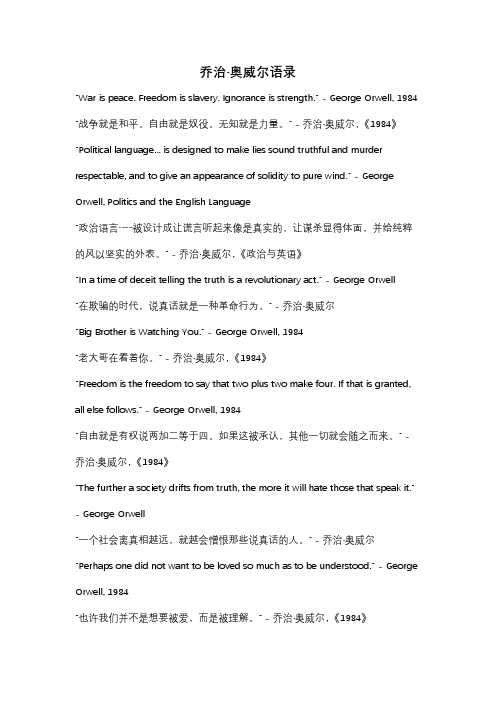
乔治·奥威尔语录"War is peace. Freedom is slavery. Ignorance is strength." - George Orwell, 1984 "战争就是和平。
自由就是奴役。
无知就是力量。
" - 乔治·奥威尔,《1984》"Political language... is designed to make lies sound truthful and murder respectable, and to give an appearance of solidity to pure wind." - George Orwell, Politics and the English Language"政治语言……被设计成让谎言听起来像是真实的,让谋杀显得体面,并给纯粹的风以坚实的外表。
" - 乔治·奥威尔,《政治与英语》"In a time of deceit telling the truth is a revolutionary act." - George Orwell"在欺骗的时代,说真话就是一种革命行为。
" - 乔治·奥威尔"Big Brother is Watching You." - George Orwell, 1984"老大哥在看着你。
" - 乔治·奥威尔,《1984》"Freedom is the freedom to say that two plus two make four. If that is granted, all else follows." - George Orwell, 1984"自由就是有权说两加二等于四。
奥威尔经典语录
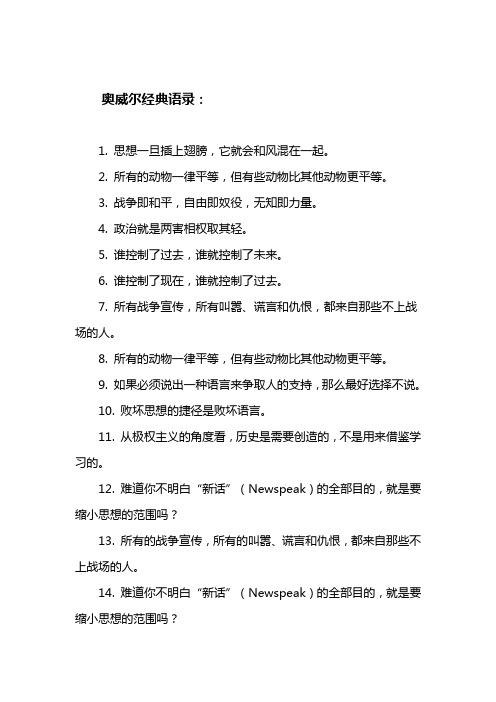
奥威尔经典语录:1. 思想一旦插上翅膀,它就会和风混在一起。
2. 所有的动物一律平等,但有些动物比其他动物更平等。
3. 战争即和平,自由即奴役,无知即力量。
4. 政治就是两害相权取其轻。
5. 谁控制了过去,谁就控制了未来。
6. 谁控制了现在,谁就控制了过去。
7. 所有战争宣传,所有叫嚣、谎言和仇恨,都来自那些不上战场的人。
8. 所有的动物一律平等,但有些动物比其他动物更平等。
9. 如果必须说出一种语言来争取人的支持,那么最好选择不说。
10. 败坏思想的捷径是败坏语言。
11. 从极权主义的角度看,历史是需要创造的,不是用来借鉴学习的。
12. 难道你不明白“新话”(Newspeak)的全部目的,就是要缩小思想的范围吗?13. 所有的战争宣传,所有的叫嚣、谎言和仇恨,都来自那些不上战场的人。
14. 难道你不明白“新话”(Newspeak)的全部目的,就是要缩小思想的范围吗?15. 谁控制了过去,谁就控制了未来。
16. 战争即和平,自由即奴役,无知即力量。
17. 所有动物一律平等,但有些动物比其他动物更平等。
18. 语言可以创造现实。
19. 所有战争宣传,所有叫嚣、谎言和仇恨,都来自那些不上战场的人。
20. 所有动物一律平等,但有些动物比其他动物更平等。
拓展资料乔治·奥威尔(George Orwell)是英国著名的作家、记者和社会评论家,也是20世纪极有影响力的政治评论家和历史学家之一。
他以敏锐的洞察力和犀利的文笔记录着他所生活的那个时代,并做出了许多超越时代的预言,被称为“一代人的冷峻良知”。
奥威尔短暂的一生中,以其敏锐的洞察力和犀利的文笔审视和记录着他所生活的那个时代。
他的代表作《一九八四》被普遍认为是20世纪最有影响力的英语小说之一,也是反极权主义的经典之作。
在小说中,他描绘了一个被极权主义控制的未来社会,人类失去了自由和思想自由。
1984奥威尔英文版

1984 Orwell English Version: A Warning Against TotalitarianismIn 1949, George Orwell wrote what is now considered a classic warning against the dangers of totalitarianism. The novel, titled "1984," takes place in a dystopian society where the government, led by the figurehead Big Brother, exerts total control over every aspect of citizens' lives. The story has captured the imagination of readers for decades through its vivid portrayal of a world without freedom or individuality.At the heart of the novel is the idea that a powerful government can manipulate reality to such an extent that individuals lose their ability to distinguish truth from lies. It is a warning about the dangers of propaganda, groupthink, and the suppression of dissenting voices. The novel describes a world where the government's control of language is so complete that citizens are unable to think rebellious thoughts, let alone act on them. Every action is monitored, and every deviation is punished severely.The use of propaganda as a tool of control is a recurring theme throughout the novel. Echoing the propaganda techniques used by totalitarian regimes in the real world, the government in 1984 creates a culture of fear and mistrust by encouraging citizens to spy on each other. It also uses slogans like "War is Peace," "Freedom is Slavery," and "Ignorance is Strength," which are designed to confuse citizens and make them more easily manipulated.The novel also raises important questions about the role of technology in society. In 1984, the government uses telescreens and hidden microphones to monitor citizens' every move. Today, we are seeing the rise of similar technology in the form of face recognition and other forms of surveillance. While these technologies can be used for good, they also have the potential to be misused by governments and other entities in ways that threaten individual privacy and civil liberties.Perhaps the most striking aspect of 1984 is its depiction of a world without hope. The protagonist of the novel, Winston Smith, is a member of the ruling Party who secretly rebels against the government's control. Yet even as he tries to resist, he is aware that he is fighting a losing battle. The novel leaves the reader with the sense that the government's control over its citizens is too complete to be broken, and that any attempt at resistance is ultimately futile.Despite its bleak outlook, 1984 remains a powerful warning against the dangers of totalitarianism. It is a reminder that the hard-won freedoms we enjoy today are fragile, and that we must remain vigilant against any attempts to undermine them. As we continue to grapple with issues of surveillance, propaganda, and individual freedom in the modern world, the lessons of this timeless novel are more important than ever.。
乔治·奥威尔语录
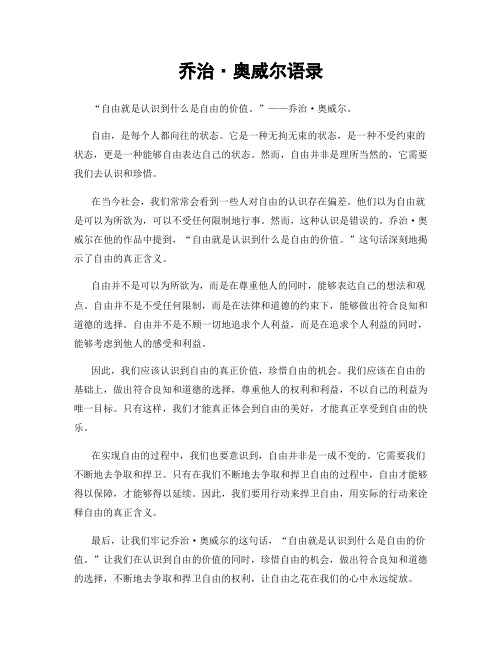
乔治·奥威尔语录“自由就是认识到什么是自由的价值。
”——乔治·奥威尔。
自由,是每个人都向往的状态。
它是一种无拘无束的状态,是一种不受约束的状态,更是一种能够自由表达自己的状态。
然而,自由并非是理所当然的,它需要我们去认识和珍惜。
在当今社会,我们常常会看到一些人对自由的认识存在偏差。
他们以为自由就是可以为所欲为,可以不受任何限制地行事。
然而,这种认识是错误的。
乔治·奥威尔在他的作品中提到,“自由就是认识到什么是自由的价值。
”这句话深刻地揭示了自由的真正含义。
自由并不是可以为所欲为,而是在尊重他人的同时,能够表达自己的想法和观点。
自由并不是不受任何限制,而是在法律和道德的约束下,能够做出符合良知和道德的选择。
自由并不是不顾一切地追求个人利益,而是在追求个人利益的同时,能够考虑到他人的感受和利益。
因此,我们应该认识到自由的真正价值,珍惜自由的机会。
我们应该在自由的基础上,做出符合良知和道德的选择,尊重他人的权利和利益,不以自己的利益为唯一目标。
只有这样,我们才能真正体会到自由的美好,才能真正享受到自由的快乐。
在实现自由的过程中,我们也要意识到,自由并非是一成不变的。
它需要我们不断地去争取和捍卫。
只有在我们不断地去争取和捍卫自由的过程中,自由才能够得以保障,才能够得以延续。
因此,我们要用行动来捍卫自由,用实际的行动来诠释自由的真正含义。
最后,让我们牢记乔治·奥威尔的这句话,“自由就是认识到什么是自由的价值。
”让我们在认识到自由的价值的同时,珍惜自由的机会,做出符合良知和道德的选择,不断地去争取和捍卫自由的权利,让自由之花在我们的心中永远绽放。
george orwell
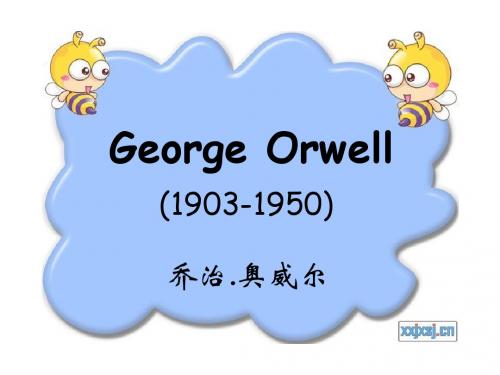
(1903-1950) 乔治.奥威尔
1.Brief introduction 2. Life experience 3.Famous works
Eric Arthur Blair
Born 25 June 1903
Bengal, India
Died 21 January 1950 London
Representative Works
In "Politics and the English Language," George Orwell provides six rules for writers ;
1. Never use a metaphor, simile, or other figure of speech which you are used to seeing in print. 2. Never use a long word where a short one will do. 3. If it is possible to cut a word out, always cut it out. 4. Never use the passive voice where you can use the active. 5. Never use a foreign phrase, a scientific word, or a jargon word if you can think of an everyday English equivalent. 6. Break any of these rules sooner than say anything outright barbarous.Occ Nhomakorabeapation
《动物农场》乌克兰文版自序:我和我形成今天政治态度的经历
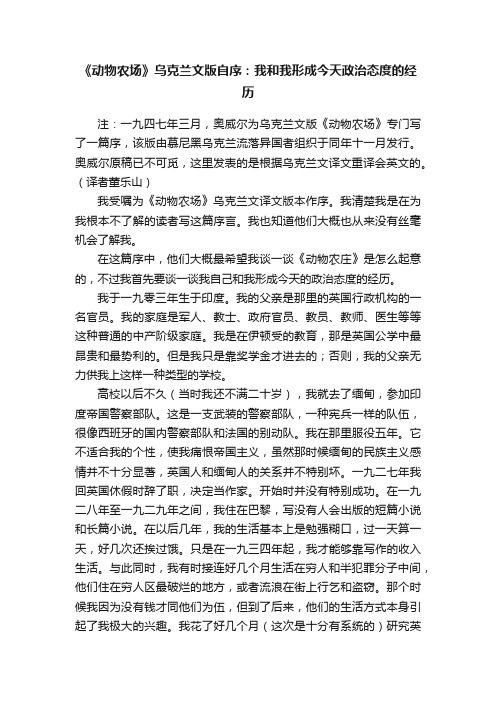
《动物农场》乌克兰文版自序:我和我形成今天政治态度的经历注:一九四七年三月,奥威尔为乌克兰文版《动物农场》专门写了一篇序,该版由慕尼黑乌克兰流落异国者组织于同年十一月发行。
奥威尔原稿已不可觅,这里发表的是根据乌克兰文译文重译会英文的。
(译者董乐山)我受嘱为《动物农场》乌克兰文译文版本作序。
我清楚我是在为我根本不了解的读者写这篇序言。
我也知道他们大概也从来没有丝毫机会了解我。
在这篇序中,他们大概最希望我谈一谈《动物农庄》是怎么起意的,不过我首先要谈一谈我自己和我形成今天的政治态度的经历。
我于一九零三年生于印度。
我的父亲是那里的英国行政机构的一名官员。
我的家庭是军人、教士、政府官员、教员、教师、医生等等这种普通的中产阶级家庭。
我是在伊顿受的教育,那是英国公学中最昂贵和最势利的。
但是我只是靠奖学金才进去的;否则,我的父亲无力供我上这样一种类型的学校。
高校以后不久(当时我还不满二十岁),我就去了缅甸,参加印度帝国警察部队。
这是一支武装的警察部队,一种宪兵一样的队伍,很像西班牙的国内警察部队和法国的别动队。
我在那里服役五年。
它不适合我的个性,使我痛恨帝国主义,虽然那时候缅甸的民族主义感情并不十分显著,英国人和缅甸人的关系并不特别坏。
一九二七年我回英国休假时辞了职,决定当作家。
开始时并没有特别成功。
在一九二八年至一九二九年之间,我住在巴黎,写没有人会出版的短篇小说和长篇小说。
在以后几年,我的生活基本上是勉强糊口,过一天算一天,好几次还挨过饿。
只是在一九三四年起,我才能够靠写作的收入生活。
与此同时,我有时接连好几个月生活在穷人和半犯罪分子中间,他们住在穷人区最破烂的地方,或者流浪在街上行乞和盗窃。
那个时候我因为没有钱才同他们为伍,但到了后来,他们的生活方式本身引起了我极大的兴趣。
我花了好几个月(这次是十分有系统的)研究英国北方矿工的情况。
到一九三零年为止,就整体而言,我并不认为我是一个社会主义者。
事实上,我当时还没有明确的政治观点。
- 1、下载文档前请自行甄别文档内容的完整性,平台不提供额外的编辑、内容补充、找答案等附加服务。
- 2、"仅部分预览"的文档,不可在线预览部分如存在完整性等问题,可反馈申请退款(可完整预览的文档不适用该条件!)。
- 3、如文档侵犯您的权益,请联系客服反馈,我们会尽快为您处理(人工客服工作时间:9:00-18:30)。
George OrwellWhy I WriteFrom a very early age, perhaps the age of five or six, I knew that when I grew up I should be a writer. Between the ages of about seventeen and twenty-four I tried to abandon this idea, but I did so with the consciousness that I was outraging my true nature and that sooner or later I should have to settle down and write books.I was the middle child of three, but there was a gap of five years on either side, and I barely saw my father before I was eight. For this and other reasons I was somewhat lonely, and I soon developed disagreeable mannerisms which made me unpopular throughout my schooldays. I had the lonely child's habit of making up stories and holding conversations with imaginary persons, and I think from the very start my literary ambitions were mixed up with the feeling of being isolated and undervalued. I knew that I had a facility with words and a power of facing unpleasant facts, and I felt that this created a sort of private world in which I could get my own back for my failure in everyday life. Nevertheless the volume of serious — i.e. seriously intended — writing which I produced all through my childhood and boyhood would not amount to half a dozen pages.I wrote my first poem at the age of four or five, my mother taking it down to dictation. I cannot remember anything about it except that it was about a tiger and the tiger had ‘chair-like teeth’ — a good enough phrase, but I fancy the poem was a plagiarism of Blake's ‘Tiger, Tiger’. At eleven, when the war or 1914-18 broke out, I wrote a patriotic poem which was printed in the local newspaper, as was another, two years later, on the death of Kitchener. From time to time, when I was a bit older, I wrote bad and usually unfinished ‘nature poems’ in the Georgian style. I also attempted a short story which was a ghastly failure. That was the total of the would-be serious work that I actually set down on paper during all those years.However, throughout this time I did in a sense engage in literary activities. To begin with there was the made-to-order stuff which I produced quickly, easily and without much pleasure to myself. Apart from school work, I wrote vers d'occasion, semi-comic poems which I could turn out at what now seems to me astonishing speed — at fourteen I wrote a whole rhyming play, in imitation of Aristophanes, in about a week — and helped to edit a school magazines, both printed and in manuscript. These magazines were the most pitiful burlesque stuff that you could imagine, and I took far less trouble with them than I now would with the cheapest journalism. But side by side with all this, for fifteen years or more, I was carrying out a literary exercise of a quite different kind: this was the making up of a continuous ‘story’ about myself, a sort of diary existing only in the mind. I believe this is a common habit of children and adolescents. As a very small child I used to imagine that I was, say, Robin Hood, and picture myself as the hero of thrilling adventures, but quite soon my ‘story’ ceased to be narcissistic in a crude way and became more and more a mere description of what I was doing and the things I saw. For minutes at a time this kind of thing would be running through my head: ‘He pushed the door open and entered the room. A yellow beam of sunlight, filtering through the muslin curtains, slanted on to the table, where a match-box, half-open, lay beside the inkpot. With his right hand in his pocket he moved across to the window. Down in the street a tortoiseshell cat was chasing a dead leaf’, etc. etc. This habit continued until Iwas about twenty-five, right through my non-literary years. Although I had to search, and did search, for the right words, I seemed to be making this descriptive effort almost against my will, under a kind of compulsion from outside. The ‘story’ must, I suppose, have reflected th e styles of the various writers I admired at different ages, but so far as I remember it always had the same meticulous descriptive quality.When I was about sixteen I suddenly discovered the joy of mere words, i.e. the sounds and associations of words. The lines from Paradise Lost —So hee with difficulty and labour hardMoved on: with difficulty and labour hee.which do not now seem to me so very wonderful, sent shivers down my backbone; and the spelling ‘hee’ for ‘he’ was an added pleasure. As for the ne ed to describe things, I knew all about it already. So it is clear what kind of books I wanted to write, in so far as I could be said to want to write books at that time. I wanted to write enormous naturalistic novels with unhappy endings, full of detailed descriptions and arresting similes, and also full of purple passages in which words were used partly for the sake of their own sound. And in fact my first completed novel, Burmese Days, which I wrote when I was thirty but projected much earlier, is rather that kind of book.I give all this background information because I do not think one can assess a writer's motives without knowing something of his early development. His subject matter will be determined by the age he lives in — at least this is true in tumultuous, revolutionary ages like our own — but before he ever begins to write he will have acquired an emotional attitude from which he will never completely escape. It is his job, no doubt, to discipline his temperament and avoid getting stuck at some immature stage, in some perverse mood; but if he escapes from his early influences altogether, he will have killed his impulse to write. Putting aside the need to earn a living, I think there are four great motives for writing, at any rate for writing prose. They exist in different degrees in every writer, and in any one writer the proportions will vary from time to time, according to the atmosphere in which he is living. They are:(i) Sheer egoism. Desire to seem clever, to be talked about, to be remembered afterdeath, to get your own back on the grown-ups who snubbed you in childhood, etc., etc. It is humbug to pretend this is not a motive, and a strong one. Writers share this characteristic with scientists, artists, politicians, lawyers, soldiers, successful businessmen — in short, with the whole top crust of humanity. The great mass of human beings are not acutely selfish.After the age of about thirty they almost abandon the sense of being individuals at all — and live chiefly for others, or are simply smothered under drudgery. But there is also the minority of gifted, willful people who are determined to live their own lives to the end, and writers belong in this class. Serious writers, I should say, are on the whole more vain and self-centered than journalists, though less interested in money.(ii) Aesthetic enthusiasm. Perception of beauty in the external world, or, on the other hand, in words and their right arrangement. Pleasure in the impact of one sound on another, in the firmness of good prose or the rhythm of a good story. Desire to share an experience which one feels is valuable and ought not to be missed. The aesthetic motive is very feeble ina lot of writers, but even a pamphleteer or writer of textbooks will have pet words andphrases which appeal to him for non-utilitarian reasons; or he may feel strongly about typography, width of margins, etc. Above the level of a railway guide, no book is quite free from aesthetic considerations.(iii) Historical impulse. Desire to see things as they are, to find out true facts and store them up for the use of posterity.(iv) Political purpose. —Using the word ‘political’ in the widest possible sense. Desire to push the world in a certain direction, to alter other peoples’ idea of the kind of society that they should strive after. Once again, no book is genuinely free from political bias. The opinion that art should have nothing to do with politics is itself a political attitude.It can be seen how these various impulses must war against one another, and how they must fluctuate from person to person and from time to time. By nature —taking your ‘nature’ to be the state you have attained when you are first adult — I am a person in whom the first three motives would outweigh the fourth. In a peaceful age I might have written ornate or merely descriptive books, and might have remained almost unaware of my political loyalties. As it is I have been forced into becoming a sort of pamphleteer. First I spent five years in an unsuitable profession (the Indian Imperial Police, in Burma), and then I underwent poverty and the sense of failure. This increased my natural hatred of authority and made me for the first time fully aware of the existence of the working classes, and the job in Burma had given me some understanding of the nature of imperialism: but these experiences were not enough to give me an accurate political orientation. Then came Hitler, the Spanish Civil War, etc. By the end of 1935 I had still failed to reach a firm decision. I remember a little poem that I wrote at that date, expressing my dilemma: A happy vicar I might have beenTwo hundred years agoTo preach upon eternal doomAnd watch my walnuts grow;But born, alas, in an evil time,I missed that pleasant haven,For the hair has grown on my upper lipAnd the clergy are all clean-shaven.And later still the times were good,We were so easy to please,We rocked our troubled thoughts to sleepOn the bosoms of the trees.All ignorant we dared to ownThe joys we now dissemble;The greenfinch on the apple boughCould make my enemies tremble.But girl's bellies and apricots,Roach in a shaded stream,Horses, ducks in flight at dawn,All these are a dream.It is forbidden to dream again;We maim our joys or hide them:Horses are made of chromium steelAnd little fat men shall ride them.I am the worm who never turned,The eunuch without a harem;Between the priest and the commissarI walk like Eugene Aram;And the commissar is telling my fortuneWhile the radio plays,But the priest has promised an Austin Seven,For Duggie always pays.I dreamt I dwelt in marble halls,And woke to find it true;I wasn't born for an age like this;Was Smith? Was Jones? Were you?The Spanish war and other events in 1936-37 turned the scale and thereafter I knew where I stood. Every line of serious work that I have written since 1936 has been written, directly or indirectly, against totalitarianism and for democratic socialism, as I understand it. It seems to me nonsense, in a period like our own, to think that one can avoid writing of such subjects. Everyone writes of them in one guise or another. It is simply a question of which side one takes and what approach one follows. And the more one is conscious of one's political bias, the more chance one has of acting politically without sacrificing one's aesthetic and intellectual integrity.What I have most wanted to do throughout the past ten years is to make political writing into an art. My starting point is always a feeling of partisanship, a sense of injustice. When I sit down to wr ite a book, I do not say to myself, ‘I am going to produce a work of art’. I write it because there is some lie that I want to expose, some fact to which I want to draw attention, and my initial concern is to get a hearing. But I could not do the work of writing a book, or even a long magazine article, if it were not also an aesthetic experience. Anyone who cares to examine my work will see that even when it is downright propaganda it contains much that a full-time politician would consider irrelevant. I am not able, and do not want, completely to abandon the world view that I acquired in childhood. So long as I remain alive and well I shall continue to feel strongly about prose style, to love the surface of the earth, and to take a pleasure in solid objects and scraps of useless information. It is no use trying to suppress that side of myself. The job is to reconcile my ingrained likes and dislikes with the essentially public, non-individual activities that this age forces on all of us.It is not easy. It raises problems of construction and of language, and it raises in a new way the problem of truthfulness. Let me give just one example of the cruder kind of difficulty that arises. My book about the Spanish civil war, Homage to Catalonia, is of course a frankly political book, but in the main it is written with a certain detachment and regard for form. I did try very hard in it to tell the whole truth without violating my literary instincts. But among other things it contains a long chapter, full of newspaper quotations and the like, defending the Trotskyists who were accused of plotting with Franco. Clearly such a chapter, which after a year or two would lose its interest for any ordinary reader, must ruin the book. A critic whom I respect read me a lecture ab out it. ‘Why did you put in all that stuff?’ he said. ‘You've turned what might have been a good book into journalism.’ What he said was true, but I could not have done otherwise. I happened to know, what very few people in England had been allowed to know, that innocent men were being falsely accused. If I had not been angry about that I should never have written the book.In one form or another this problem comes up again. The problem of language is subtler and would take too long to discuss. I will only say that of late years I have tried to write lesspicturesquely and more exactly. In any case I find that by the time you have perfected any style of writing, you have always outgrown it. Animal Farm was the first book in which I tried, with full consciousness of what I was doing, to fuse political purpose and artistic purpose into one whole. I have not written a novel for seven years, but I hope to write another fairly soon. It is bound to be a failure, every book is a failure, but I do know with some clarity what kind of book I want to write. Looking back through the last page or two, I see that I have made it appear as though my motives in writing were wholly public-spirited. I don't want to leave that as the final impression. All writers are vain, selfish, and lazy, and at the very bottom of their motives there lies a mystery. Writing a book is a horrible, exhausting struggle, like a long bout of some painful illness. One would never undertake such a thing if one were not driven on by some demon whom one can neither resist nor understand. For all one knows that demon is simply the same instinct that makes a baby squall for attention. And yet it is also true that one can write nothing readable unless one constantly struggles to efface one's own personality. Good prose is like a windowpane. I cannot say with certainty which of my motives are the strongest, but I know which of them deserve to be followed. And looking back through my work, I see that it is invariably where I lacked a political purpose that I wrote lifeless books and was betrayed into purple passages, sentences without meaning, decorative adjectives and humbug generally.1946。
